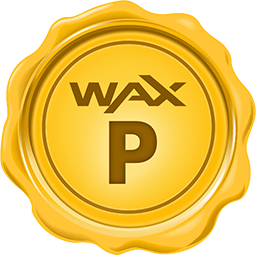-
 Bitcoin
Bitcoin $84,912.1002
0.22% -
 Ethereum
Ethereum $1,597.4099
0.99% -
 Tether USDt
Tether USDt $1.0000
0.00% -
 XRP
XRP $2.0848
1.56% -
 BNB
BNB $592.5467
0.52% -
 Solana
Solana $138.6661
3.38% -
 USDC
USDC $1.0000
0.02% -
 Dogecoin
Dogecoin $0.1597
3.32% -
 TRON
TRON $0.2416
-1.86% -
 Cardano
Cardano $0.6327
3.32% -
 UNUS SED LEO
UNUS SED LEO $9.2836
0.56% -
 Chainlink
Chainlink $12.7262
1.41% -
 Avalanche
Avalanche $19.2768
1.31% -
 Stellar
Stellar $0.2442
1.08% -
 Toncoin
Toncoin $2.9950
1.32% -
 Shiba Inu
Shiba Inu $0.0...01231
4.65% -
 Hedera
Hedera $0.1668
2.11% -
 Sui
Sui $2.1474
1.41% -
 Bitcoin Cash
Bitcoin Cash $337.5269
2.68% -
 Hyperliquid
Hyperliquid $17.5726
3.68% -
 Polkadot
Polkadot $3.7336
2.05% -
 Litecoin
Litecoin $76.5245
1.70% -
 Dai
Dai $1.0001
0.02% -
 Bitget Token
Bitget Token $4.4585
2.30% -
 Ethena USDe
Ethena USDe $0.9993
0.01% -
 Pi
Pi $0.6558
7.05% -
 Monero
Monero $214.1926
-0.69% -
 Uniswap
Uniswap $5.2567
1.90% -
 Pepe
Pepe $0.0...07325
4.28% -
 OKB
OKB $50.6926
1.82%
How much will the customized requirements for blockchain system development increase costs?
Complexity, integration, security, customization, scalability, and team expertise all contribute to the high costs of blockchain development.
Apr 17, 2025 at 07:56 pm

Developing a blockchain system involves various customized requirements that can significantly impact the overall cost. Understanding these factors and their effects on the budget is crucial for any organization planning to implement a blockchain solution. This article delves into the key elements that can increase costs in blockchain system development and provides insights into managing these expenses effectively.
Complexity of the Blockchain Architecture
The complexity of the blockchain architecture is a primary factor that can drive up costs. A simple blockchain designed for basic transaction recording will be less expensive than a more sophisticated system that includes features like smart contracts, multiple consensus mechanisms, or integration with other technologies. For instance, a blockchain that needs to handle high transaction volumes and ensure low latency might require a more robust and hence costlier infrastructure.
When designing the architecture, developers must consider the scalability, security, and interoperability requirements. Each of these elements adds layers of complexity, which in turn increases the development time and costs. A highly customized blockchain architecture tailored to specific business needs can be significantly more expensive than a generic, off-the-shelf solution.
Integration with Existing Systems
Integration with existing systems is another crucial aspect that can elevate the cost of blockchain development. Many organizations already have established IT infrastructures, and integrating a new blockchain system with these existing systems can be challenging and costly. This integration often requires custom APIs, middleware, and sometimes even a complete overhaul of the existing systems to ensure seamless communication and data flow.
For example, if a company wants to integrate its blockchain with an existing ERP system, it might need to develop custom connectors or modify the ERP system to be blockchain-compatible. This process involves not only technical development but also extensive testing to ensure that the integration does not disrupt existing operations. The more complex the existing systems and the more extensive the integration required, the higher the costs will be.
Security and Compliance Requirements
Security and compliance requirements are non-negotiable in blockchain development, especially for industries like finance and healthcare. Implementing high-level security measures, such as advanced encryption, multi-signature wallets, and robust authentication protocols, can significantly increase development costs. Additionally, ensuring compliance with regulations like GDPR, HIPAA, or KYC/AML can require additional development efforts and specialized expertise.
Security audits and penetration testing are essential to identify and mitigate vulnerabilities, but these services come at a cost. Compliance with various regulatory frameworks might also necessitate the involvement of legal experts, further adding to the expenses. The more stringent the security and compliance requirements, the more resources will be needed to meet them, thus increasing the overall cost of the blockchain system.
Customization of Smart Contracts
Customization of smart contracts is another area where costs can escalate. Smart contracts are self-executing contracts with the terms of the agreement directly written into code. While basic smart contracts can be relatively inexpensive to develop, highly customized smart contracts that need to handle complex logic, multiple conditional statements, and integration with external data sources can be much more costly.
Developing and testing these custom smart contracts requires skilled developers with expertise in programming languages like Solidity or Rust. Additionally, the more complex the smart contract, the more time and resources are needed for thorough testing to ensure that it functions correctly and securely. This customization can significantly increase the development time and, consequently, the costs.
Scalability and Performance Enhancements
Scalability and performance enhancements are critical for blockchain systems that need to handle large volumes of transactions or operate at high speeds. Achieving high scalability and performance often requires advanced techniques such as sharding, off-chain transactions, or layer-2 solutions. These techniques are complex and can significantly increase the development costs.
For instance, implementing sharding involves dividing the blockchain into smaller, more manageable parts to increase transaction throughput. This requires sophisticated development and extensive testing to ensure that the system remains secure and functional. Similarly, off-chain transactions and layer-2 solutions require additional infrastructure and development efforts, all of which contribute to higher costs.
Development Team Expertise and Size
The expertise and size of the development team also play a significant role in determining the cost of blockchain development. Hiring experienced blockchain developers, especially those with expertise in specific areas like smart contract development or consensus algorithms, can be expensive. The more specialized the skills required, the higher the salaries and consulting fees will be.
Additionally, the size of the development team can impact costs. A larger team might be necessary for complex projects with tight deadlines, but it also means higher payroll expenses. Balancing the need for skilled developers with budget constraints is crucial for managing costs effectively.
FAQs
Q1: Can using open-source blockchain platforms reduce the cost of development?
A1: Yes, using open-source blockchain platforms like Ethereum or Hyperledger can reduce development costs. These platforms provide a foundational framework that can be customized to meet specific needs, potentially saving time and resources compared to building a blockchain from scratch. However, the extent of customization required will still impact the overall cost.
Q2: How does the choice of consensus mechanism affect development costs?
A2: The choice of consensus mechanism can significantly impact development costs. For example, Proof of Work (PoW) is more resource-intensive and complex to implement than Proof of Stake (PoS) or Delegated Proof of Stake (DPoS). The more complex the consensus mechanism, the more development time and expertise are required, leading to higher costs.
Q3: Are there any ongoing costs associated with maintaining a blockchain system?
A3: Yes, there are ongoing costs associated with maintaining a blockchain system. These include costs for node operation, regular security updates, compliance monitoring, and potential upgrades or enhancements to the system. The complexity of the blockchain and the level of customization will influence these ongoing expenses.
Q4: How can organizations manage and potentially reduce the costs of blockchain development?
A4: Organizations can manage and potentially reduce the costs of blockchain development by clearly defining their requirements, prioritizing features, and starting with a minimum viable product (MVP). Utilizing open-source platforms, outsourcing certain development tasks to specialized firms, and continuously monitoring and optimizing the development process can also help control costs.
Disclaimer:info@kdj.com
The information provided is not trading advice. kdj.com does not assume any responsibility for any investments made based on the information provided in this article. Cryptocurrencies are highly volatile and it is highly recommended that you invest with caution after thorough research!
If you believe that the content used on this website infringes your copyright, please contact us immediately (info@kdj.com) and we will delete it promptly.
- Ethena Labs Unveils Converge, a New Layer-1 Blockchain Targeting Tokenized Real-World Assets
- 2025-04-19 12:20:14
- FBI Releases Five Warnings to Help Protect Investors in the Cryptocurrency Space
- 2025-04-19 12:20:14
- Today, the Official Trump ($TRUMP) meme coin tokens have been unlocked, sparking panic among investors.
- 2025-04-19 12:15:14
- Dogecoin (DOGE) Price Prediction: Will the Original Memecoin Reach $1 by Late Summer 2025?
- 2025-04-19 12:15:14
- Resilience is a Distinct Attribute of Solana
- 2025-04-19 12:10:13
- Astar Network Adjusts Its Token Issuance Model to Stabilize APY and Reduce Inflation
- 2025-04-19 12:10:13
Related knowledge
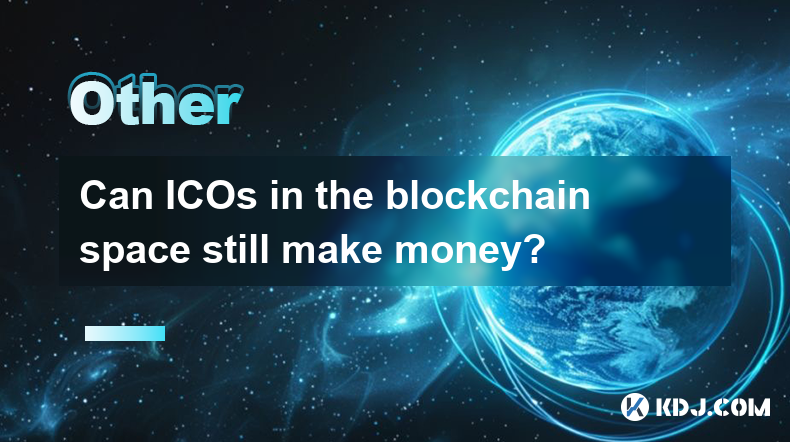
Can ICOs in the blockchain space still make money?
Apr 17,2025 at 08:29pm
The landscape of Initial Coin Offerings (ICOs) in the blockchain space has evolved significantly since their peak in 2017 and 2018. Despite the increased regulatory scrutiny and the rise of alternative fundraising methods like Security Token Offerings (STOs) and Initial Exchange Offerings (IEOs), ICOs can still be a viable way to raise funds and generat...
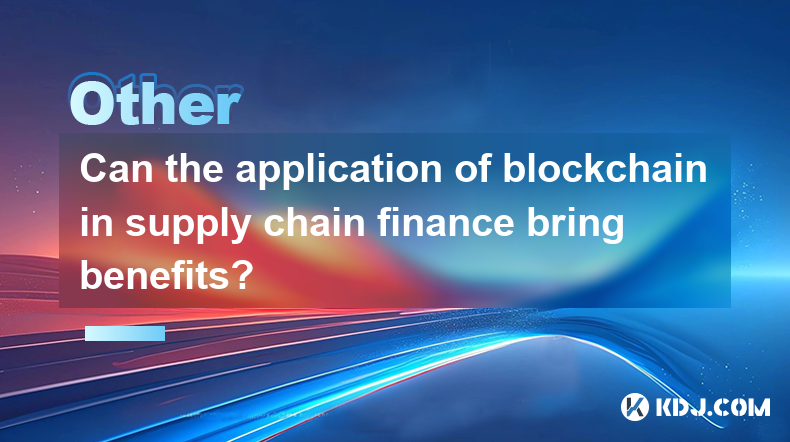
Can the application of blockchain in supply chain finance bring benefits?
Apr 15,2025 at 04:00pm
Can the application of blockchain in supply chain finance bring benefits? The integration of blockchain technology into supply chain finance has garnered significant attention in the cryptocurrency and financial sectors. This article explores how blockchain can potentially revolutionize supply chain finance, detailing its benefits and providing a compre...

Does the ranking of Chinese blockchain apps include cross-chain applications?
Apr 14,2025 at 04:00pm
The ranking of Chinese blockchain apps is a comprehensive evaluation that takes into account various aspects such as user base, transaction volume, and technological innovation. A pertinent question arises regarding whether these rankings include cross-chain applications. Cross-chain applications, which allow different blockchain networks to interact an...
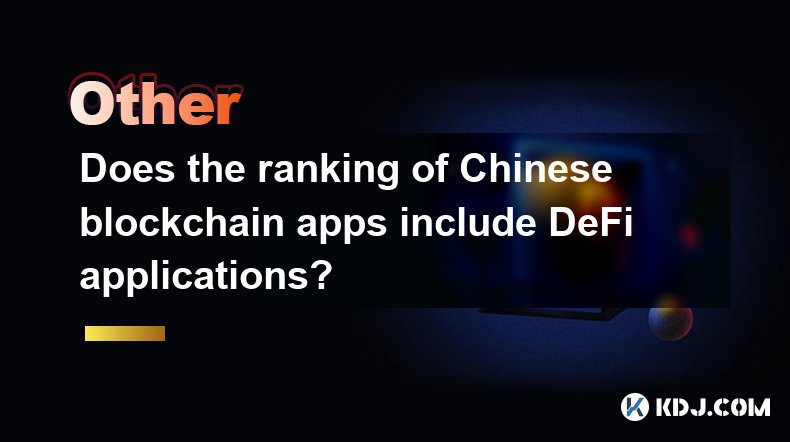
Does the ranking of Chinese blockchain apps include DeFi applications?
Apr 15,2025 at 06:57am
The ranking of Chinese blockchain apps is a comprehensive list that showcases the most popular and influential applications within the cryptocurrency ecosystem. One question that often arises is whether these rankings include DeFi applications. To answer this, we need to delve into the specifics of how these rankings are compiled and what types of appli...
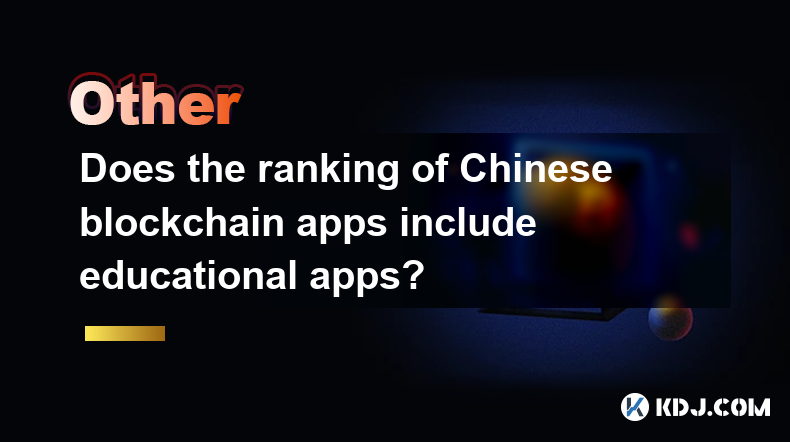
Does the ranking of Chinese blockchain apps include educational apps?
Apr 16,2025 at 03:35am
The ranking of Chinese blockchain apps often includes a variety of categories, from finance and gaming to social networking and beyond. One question that frequently arises is whether these rankings include educational apps. To address this, we need to delve into the specifics of how blockchain apps are categorized and ranked in China, and whether educat...
Does the ranking of Chinese blockchain apps include enterprise-level applications?
Apr 15,2025 at 06:42am
The ranking of Chinese blockchain apps often includes a variety of applications, ranging from consumer-focused to enterprise-level solutions. Understanding the scope and criteria for these rankings is essential to determine if enterprise-level applications are included. This article delves into the specifics of how Chinese blockchain app rankings are co...

Can ICOs in the blockchain space still make money?
Apr 17,2025 at 08:29pm
The landscape of Initial Coin Offerings (ICOs) in the blockchain space has evolved significantly since their peak in 2017 and 2018. Despite the increased regulatory scrutiny and the rise of alternative fundraising methods like Security Token Offerings (STOs) and Initial Exchange Offerings (IEOs), ICOs can still be a viable way to raise funds and generat...

Can the application of blockchain in supply chain finance bring benefits?
Apr 15,2025 at 04:00pm
Can the application of blockchain in supply chain finance bring benefits? The integration of blockchain technology into supply chain finance has garnered significant attention in the cryptocurrency and financial sectors. This article explores how blockchain can potentially revolutionize supply chain finance, detailing its benefits and providing a compre...

Does the ranking of Chinese blockchain apps include cross-chain applications?
Apr 14,2025 at 04:00pm
The ranking of Chinese blockchain apps is a comprehensive evaluation that takes into account various aspects such as user base, transaction volume, and technological innovation. A pertinent question arises regarding whether these rankings include cross-chain applications. Cross-chain applications, which allow different blockchain networks to interact an...

Does the ranking of Chinese blockchain apps include DeFi applications?
Apr 15,2025 at 06:57am
The ranking of Chinese blockchain apps is a comprehensive list that showcases the most popular and influential applications within the cryptocurrency ecosystem. One question that often arises is whether these rankings include DeFi applications. To answer this, we need to delve into the specifics of how these rankings are compiled and what types of appli...

Does the ranking of Chinese blockchain apps include educational apps?
Apr 16,2025 at 03:35am
The ranking of Chinese blockchain apps often includes a variety of categories, from finance and gaming to social networking and beyond. One question that frequently arises is whether these rankings include educational apps. To address this, we need to delve into the specifics of how blockchain apps are categorized and ranked in China, and whether educat...

Does the ranking of Chinese blockchain apps include enterprise-level applications?
Apr 15,2025 at 06:42am
The ranking of Chinese blockchain apps often includes a variety of applications, ranging from consumer-focused to enterprise-level solutions. Understanding the scope and criteria for these rankings is essential to determine if enterprise-level applications are included. This article delves into the specifics of how Chinese blockchain app rankings are co...
See all articles


















































































